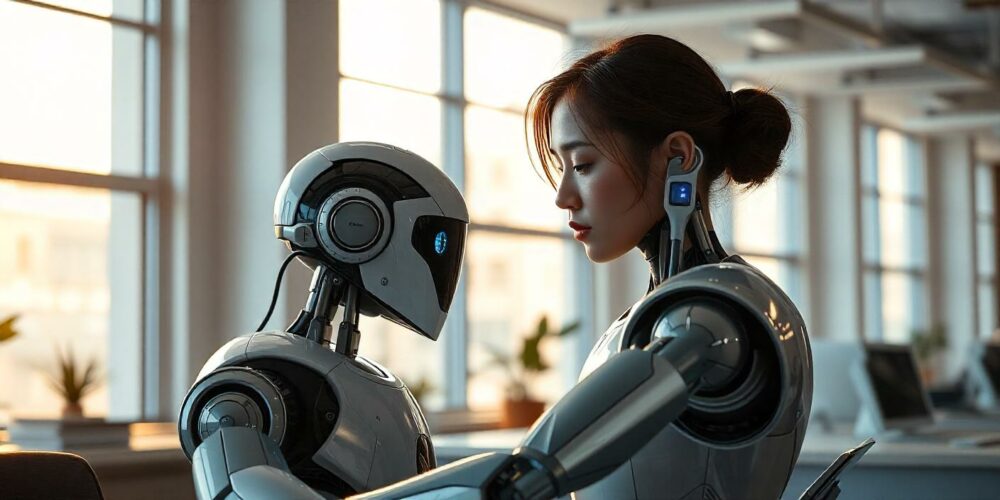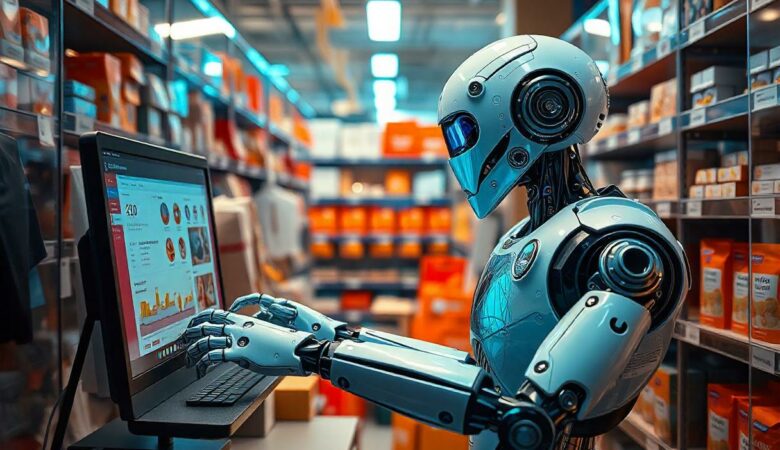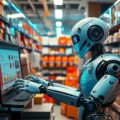As we hurtle towards 2025, artificial intelligence is set to transform the job market like never before. While some industries will flourish, others might dwindle. Let’s dive into the sectors AI will dominate soon.
Table of Contents
- What type of jobs will AI replace?
- Which jobs are in danger due to AI in Upcoming Years?
- What kind of jobs will never be replaced by AI?
- What to do If your job is replaced by AI?
- Conclusion
What type of jobs will AI replace?
AI’s rapid advancements make it perfect for automating repetitive tasks, but which roles are most vulnerable?
Manufacturing Jobs
- Assembly lines are already seeing a shift towards automation. AI-powered robots can work tirelessly and efficiently, leading to fewer human roles.
- Assembly line workers
- Machine operators
- Quality control inspectors
Customer Service
- Chatbots are getting smarter by the day, offering seamless and quick customer service. Their efficiency could push human agents out of routine roles.
- Call center agents
- Help desk support
- Live chat representatives
Data Entry and Analysis
- Handling large datasets is AI’s sweet spot. It can process information quicker and more accurately than a human, posing a risk to those in data-centric jobs.
- Data entry clerks
- Financial analysts
- Bookkeepers
Transportation
- Self-driving technology is progressing rapidly, making drivers in logistics and transport industries vulnerable to AI disruption.
- Truck drivers
- Taxi and rideshare drivers
- Delivery personnel
Retail
- Automated checkouts, inventory management systems, and even AI-driven customer interactions are becoming the norm, potentially reducing the need for retail workers.
- Cashiers
- Stock clerks
- Sales associates
Which jobs are in danger due to AI in Upcoming Years?
Certain sectors may experience significant upheaval due to AI adoption. Here’s a peek into some vulnerable industries:

Healthcare Support Roles
- AI systems are improving diagnostic accuracy and can assist with administrative tasks, which could minimize the demand for support roles in healthcare.
- Medical transcriptionists
- Administrative staff
- Pharmacy technicians
Finance and Accounting
- Automation in auditing, payroll, and compliance will grow, leaving fewer opportunities for humans in these traditionally secure fields.
- Accountants
- Auditors
- Loan officers
Journalism and Content Creation
- With AI being capable of writing basic articles, certain jobs in journalism may face a threat, especially for routine reporting and SEO-driven content.
- Content writers
- Copy editors
- Reporters
Legal Sector
- Document review and contract analysis are areas where AI is particularly effective, impacting jobs in paralegal and administrative support roles.
- Paralegals
- Legal assistants
- Court clerks
HR and Recruitment
- AI is increasingly being used to screen resumes and handle preliminary interview processes, which could reduce the need for recruiters.
- HR coordinators
- Recruitment specialists
- Payroll managers
What kind of jobs will never be replaced by AI?
While AI is powerful, some areas will remain uniquely human, relying on creativity, empathy, and interpersonal skills.
Creative Roles
- AI may assist in design, but the ability to innovate and think outside the box is a distinctly human trait.
- Artists
- Writers
- Graphic designers
Healthcare Practitioners
- Though AI can analyze data, it cannot replace the human touch necessary for patient care.
- Doctors
- Nurses
- Surgeons
Psychologists and Therapists
- Emotional intelligence and understanding are areas where AI lacks, making these jobs secure from automation.
- Therapists
- Counselors
- Social workers
Education and Teaching
- While AI can provide tutoring assistance, the human connection in teaching is irreplaceable.
- Teachers
- Professors
- Educational counselors
Entrepreneurs and Business Leaders
- Decision-making, leadership, and business strategy require a level of intuition and creativity that AI cannot mimic.
- CEOs
- Business strategists
- Entrepreneurs
What to do If your job is replaced by AI?
If AI replaces your job, it’s not the end of the world. Here are some steps you can take to stay ahead.
Upskill and Reskill
- Learning new skills, especially in areas where AI can’t compete, like emotional intelligence, creativity, and management, can keep you in demand.
- Enroll in online courses
- Attend workshops
- Learn soft skills
Consider New Career Paths
- Some industries are less susceptible to AI disruption, such as healthcare, education, or creative fields.
- Healthcare
- Education
- Entrepreneurship
Leverage AI to Your Advantage
- Rather than fearing AI, learn to work alongside it. Using AI tools can improve your productivity and open up new career opportunities.
- AI in marketing
- AI in design
- AI in customer service
Freelance or Start a Business
- As traditional jobs are disrupted, freelancing and entrepreneurship are on the rise. Consider starting your own venture or offering freelance services in high-demand sectors.
- Freelance platforms
- Startups
- Consulting
Stay Adaptable
- The key to thriving in an AI-driven world is adaptability. Keep an open mind and be ready to pivot to new opportunities as they arise.
- Flexibility
- Learning agility
- Continuous growth mindset
Conclusion
AI’s takeover of various job sectors by 2025 is inevitable, but it’s not all doom and gloom. While some roles will disappear, many new opportunities will emerge. Staying ahead by learning new skills, adapting to change, and embracing AI as a tool rather than a threat is the best strategy for the future.











Leave a Reply